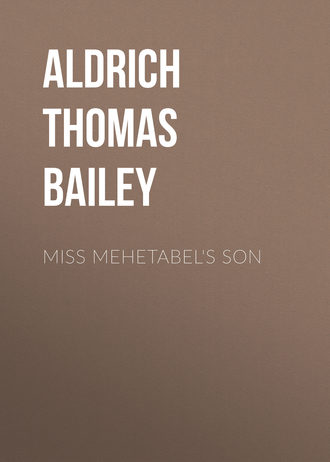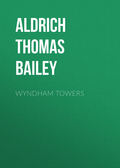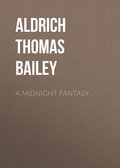
Aldrich Thomas Bailey
Miss Mehetabel's Son
This was a stroke of flattery so delicate and indirect that I could accept it without immodesty.
There had lately sprung up on the corner of Mr. Jaffrey’s bureau a small tin house, Gothic in architecture and pink in color, with a slit in the roof, and the word Bank painted on one façade. Several times in the course of an evening Mr. Jaffrey would rise from his chair without interrupting the conversation, and gravely drop a nickel into the scuttle of the bank. It was pleasant to observe the solemnity of his countenance as he approached the edifice, and the air of triumph with which he resumed his seat by the fireplace. One night I missed the tin bank. It had disappeared, deposits and all, like a real bank. Evidently there had been a defalcation on rather a large scale. I strongly suspected that Mr. Sewell was at the bottom of it, but my suspicion was not shared by Mr. Jaffrey, who, remarking my glance at the bureau, became suddenly depressed. “I ‘m afraid,” he said, “that I have failed to instil into Andrew those principles of integrity which—which”—and the old gentleman quite broke down.
Andy was now eight or nine years old, and for some time past, if the truth must be told, had given Mr. Jaffrey no inconsiderable trouble; what with his impishness and his illnesses, the boy led the pair of us a lively dance. I shall not soon forget the anxiety of Mr. Jaffrey the night Andy had the scarlet-fever—an anxiety which so infected me that I actually returned to the tavern the following afternoon earlier than usual, dreading to hear that the little spectre was dead, and greatly relieved on meeting Mr. Jaffrey at the door-step with his face wreathed in smiles. When I spoke to him of Andy, I was made aware that I was inquiring into a case of scarlet-fever that had occurred the year before!
It was at this time, towards the end of my second week at Greenton, that I noticed what was probably not a new trait—Mr. Jaffrey’s curious sensitiveness to atmospherical changes. He was as sensitive as a barometer. The approach of a storm sent his mercury down instantly. When the weather was fair he was hopeful and sunny, and Andy’s prospects were brilliant. When the weather was overcast and threatening he grew restless and despondent, and was afraid that the boy was not going to turn out well.
On the Saturday previous to my departure, which had been fixed for Monday, it rained heavily all the afternoon, and that night Mr. Jaffrey was in an unusually excitable and unhappy frame of mind. His mercury was very low indeed.
“That boy is going to the dogs just as fast as he can go,” said Mr. Jaffrey, with a woful face. “I can’t do anything with him.”
“He’ll come out all right, Mr. Jaffrey. Boys will be boys. I would not give a snap for a lad without animal spirits.”
“But animal spirits,” said Mr. Jaffrey sententiously, “should n’t saw off the legs of the piano in Tobias’s best parlor. I don’t know what Tobias will say when he finds it out.”
“What! has Andy sawed off the legs of the old spinet?” I returned, laughing. “Worse than that.” “Played upon it, then!” “No, sir. He has lied to me!” “I can’t believe that of Andy.” “Lied to me, sir,” repeated Mr. Jaffrey, severely. “He pledged me his word of honor that he would give over his climbing. The way that boy climbs sends a chill down my spine. This morning, notwithstanding his solemn promise, he shinned up the lightning-rod attached to the extension, and sat astride the ridge-pole. I saw him, and he denied it! When a boy you have caressed and indulged and lavished pocket-money on lies to you and will climb, then there’s nothing more to be said. He’s a lost child.” “You take too dark a view of it, Mr. Jaffrey. Training and education are bound to tell in the end, and he has been well brought up.”
“But I did n’t bring him up on a lightning-rod, did I? If he is ever going to know how to behave, he ought to know now. To-morrow he will be eleven years old.”
The reflection came to me that if Andy had not been brought up by the rod, he had certainly been brought up by the lightning. He was eleven years old in two weeks!
I essayed, with that perspicacious wisdom which seems to be the peculiar property of bachelors and elderly maiden ladies, to tranquillize Mr. Jaffrey’s mind, and to give him some practical hints on the management of youth.
“Spank him,” I suggested at last.
“I will!” said the old gentleman.
“And you ‘d better do it at once!” I added, as it flashed upon me that in six months Andy would be a hundred and forty-three years old!—an age at which parental discipline would have to be relaxed.
The next morning. Sunday, the rain came down as if determined to drive the quicksilver entirely out of my poor friend. Mr. Jaffrey sat bolt upright at the breakfast-table, looking as woe-begone as a bust of Dante, and retired to his chamber the moment the meal was finished. As the day advanced, the wind veered round to the northeast, and settled itself down to work. It was not pleasant to think, and I tried not to think, what Mr. Jaffrey’s condition would be if the weather did not mend its manners by noon; but so far from clearing off at noon, the storm increased in violence, and as night set in the wind whistled in a spiteful falsetto key, and the rain lashed the old tavern as if it were a balky horse that refused to move on. The windows rattled in the worm-eaten frames, and the doors of remote rooms, where nobody ever went, slammed to in the maddest way. Now and then the tornado, sweeping down the side of Mount Agamenticus, bowled across the open country, and struck the ancient hostelry point-blank.
Mr. Jaffrey did not appear at supper. I knew that he was expecting me to come to his room as usual, and I turned over in my mind a dozen plans to evade seeing him that night. The landlord sat at the opposite side of the chimney-place, with his eye upon me. I fancy he was aware of the effect of this storm on his other boarder, for at intervals, as the wind hurled itself against the exposed gable, threatening to burst in the windows, Mr. Sewell tipped me an atrocious wink, and displayed his gums in a way he had not done since the morning after my arrival at Greenton. I wondered if he suspected anything about Andy. There had been odd times during the past week when I felt convinced that the existence of Miss Mehetabel’s son was no secret to Mr. Sewell.
In deference to the gale, the landlord sat up half an hour later than was his custom. At half-past eight he went to bed, remarking that he thought the old pile would stand till morning.
He had been absent only a few minutes when I heard a rustling at the door. I looked up, and beheld Mr. Jaffrey standing on the threshold, with his dress in disorder, his scant hair flying, and the wildest expression on his face.
“He’s gone!” cried Mr. Jaffrey.
“Who? Sewell? Yes, he just went to bed.”
“No, not Tobias—the boy!”
“What, run away?”
“No—he is dead! He has fallen from a step-ladder in the red chamber and broken his neck!”
Mr. Jaffrey threw up his hands with a gesture of despair, and disappeared. I followed him through the hall, saw him go into his own apartment, and heard the bolt of the door drawn to. Then I returned to the bar-room, and sat for an hour or two in the ruddy glow of the fire, brooding over the strange experience of the last fortnight.
On my way to bed I paused at Mr. Jaf-frey’s door, and, in a lull of the storm, the measured respiration within told me that the old gentleman was sleeping peacefully.
Slumber was coy with me that night. I lay listening to the soughing of the wind, and thinking of Mr. Jaffrey’s illusion. It had amused me at first with its grotesqueness; but now the poor little phantom was dead, I was conscious that there had been something pathetic in it all along. Shortly after midnight the wind sunk down, coming and going fainter and fainter, floating around the eaves of the tavern with an undulating, murmurous sound, as if it were turning itself into soft wings to bear away the spirit of a little child.







